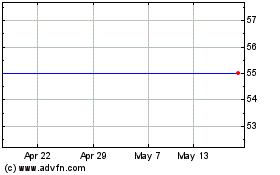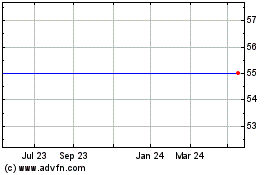Verona Pharma PLC Add-on Phase II RPL554 study
May 10 2016 - 2:00AM
UK Regulatory
TIDMVRP
Verona Pharma plc
("Verona Pharma" or the "Company")
Verona Pharma announces positive results from "add-on" Phase II trial with
RPL554
RPL554 produced over 60% additional bronchodilation on top of standard of care
bronchodilators in COPD patients
Data implies RPL554, alone or in combination with other bronchodilators, may
reduce dyspnea, a major debilitating symptom of COPD
10 May 2016, Cardiff - Verona Pharma plc (AIM: VRP.L), the drug development
company focused on first-in-class medicines to treat respiratory diseases,
today announces highly positive headline data from a Phase IIa study that
assessed the bronchodilator effect of nebulised RPL554 administered on top of
salbutamol and ipratropium bromide in patients with COPD. RPL554 is a novel
inhaled dual PDE3/PDE4 inhibitor with both bronchodilator and anti-inflammatory
properties in the same molecule, which is currently in development as a
nebulised treatment for acute exacerbations in chronic obstructive pulmonary
disorder (COPD) patients in a hospital or for maintenance treatment in a
home-care setting. Such patients typically require additional bronchodilation,
despite being on approved COPD bronchodilator medications such as salbutamol, a
beta2-agonist, and ipratropium bromide, an anti-muscarinic.
Highlights
* Primary objective of study met
+ RPL554 produced a highly significant (p?0.001) and a clinically
meaningful additional (>60%) bronchodilation on top of the administered
standard of care bronchodilators, salbutamol and ipratropium bromide
+ The bronchodilator effects seen with the combinations were
significantly (p?0.001) larger than those of either salbutamol or
ipratropium bromide alone, which were in turn all significantly greater
than placebo
* Secondary objectives also met including
+ The combination of RPL554 with salbutamol or ipratropium bromide caused
a significant reduction (p=0.0002 and p=0.004 respectively) in trapped
air in the lung (residual volume) as compared to salbutamol or
ipratropium bromide alone
o Suggesting that RPL554 treatment may reduce dyspnea, a major
debilitating symptom of COPD1
* Consistent with previous studies, RPL554 was well tolerated both alone and
in combination
+ No effect on vital signs or ECG parameters
+ No gastro-intestinal adverse events recorded
Professor Dave Singh of the Medicines Evaluation Unit, University of Manchester
and Principal Investigator in this trial, commented:
"Achieving more than an additional 60% improvement in lung function on
administration of RPL554 in moderate to severe COPD patients, already
pre-treated with standard of care bronchodilators, is clinically highly
significant, especially as the addition of RPL554 appears to be well
tolerated."
Dr Jan-Anders Karlsson, the CEO of Verona Pharma, said:
"The robustly positive results from this well-controlled Phase IIa trial
vindicate the rationale for developing a novel bronchodilator for treatment of
patients with moderate to severe disease and acute exacerbations of COPD, who
will typically already be on other bronchodilators, but require additional
relief."
"With the successful conclusion of this trial, we now believe we have the
required data in hand from our Phase IIa studies to progress RPL554 confidently
into a Phase IIb clinical trial programme. This will explore further its
potential as a novel nebulised treatment for moderate to severe COPD patients
in a hospital or home-care setting, a multi-billion dollar market."
The nebuliser bronchodilator market was worth about $1 billion in 2014 in the
US.2 RPL554 also has potential as a novel drug for the maintenance therapy of
COPD, and for patients with asthma and cystic fibrosis.
Details of the clinical study
In this Phase II randomised, double blind, placebo controlled, six-way
crossover study patients with moderate to severe COPD were randomised to
receive a single dose from a blinded pressured metered dose inhaler (pMDI),
containing either salbutamol (200 micrograms) or placebo followed by a single
dose from a second blinded pMDI which contained ipratropium bromide (40
micrograms) or placebo. This was followed immediately by a single double blind
dose of nebulised RPL554 (6mg) or placebo. Lung function was measured pre-dose
and up to 12h post dose. The administered salbutamol and ipratropium bromide
doses used in this study are standard approved doses of these medications for
COPD patients. 30 subjects completed the study.
The study met its primary objective of a statistically significant increase in
peak forced expiratory volume in one second, FEV1, (p<0.001) and a
statistically significant increase in average FEV1 response over 8 hours (p
<0.001). All treatments including RPL554 when given as single agents were
significantly (p<0.001) better than placebo. RPL554 added over 60% additional
bronchodilation on top of either salbutamol or ipratropium bromide.
Secondary outcome measures were change in lung volumes and airway conductance
as well as safety. There was a marked, statistically significant reduction in
trapped air in the lung (residual volume) indicating an improvement in lung
hyperinflation. As with FEV1, the combination of RPL554 and either salbutamol
or ipratropium was more effective than either agent alone. This should
translate into an improvement in dyspnea (shortness of breath), a major
debilitating symptom of COPD, and suggests that RPL554 is having an effect both
in central and peripheral airways. RPL554 was well tolerated both alone and in
combination with the other bronchodilators used in the study. There was no
effect of RPL554 alone or in combination on vital signs or ECG parameters
The study was conducted at The Medicines Evaluation Unit ("MEU"), one of the
UK's leading contract research organisations under principal investigator
Professor Dave Singh.
The data from the study reported today will help inform the trial design for
the forthcoming Phase IIb study, which it is currently expected to commence in
early 2017.
1 Dyspnea (shortness of breath) in COPD patients is often associated with
hyperinflation of the lungs resulting from a higher residual volume of air
2 IMS Consulting Group market research 2014
-Ends-
For further information, please contact:
Verona Pharma plc Tel: +44 (0)20 7863 3300
Jan-Anders Karlsson, CEO
N+1 Singer Tel: +44 (0)20 7496 3000
Aubrey Powell / Jen Boorer
FTI Consulting Tel: +44 (0)20 3727 1000
Simon Conway / Julia Phillips
Notes to Editors
About Verona Pharma plc
Verona Pharma plc is a UK-based clinical stage biopharmaceutical company
focused on the development of innovative prescription medicines to treat
respiratory diseases with significant unmet medical needs, such as chronic
obstructive pulmonary disease (COPD), asthma and cystic fibrosis.
Verona Pharma's lead drug, RPL554, is a first-in-class drug currently in Phase
2 trials as a nebulised treatment for acute exacerbations of COPD in the
hospital setting. The drug is a dual phosphodiesterase (PDE) 3/4 inhibitor and
therefore has both bronchodilator and anti-inflammatory effects, which are
essential to the improvement of patients with COPD and asthma.
Verona Pharma is also building a broader portfolio of RPL554-containing
products to maximise its benefit to patients and its value. This includes the
very significant markets for COPD and asthma maintenance therapy. In addition,
the Company is exploring the potential of the drug in different diseases, such
as cystic fibrosis, where it is in pre-clinical testing and has received a
Venture and Innovation Award from the UK Cystic Fibrosis Trust.
About The Medicines Evaluation Unit
The Medicines Evaluation Unit ("MEU") is one of the UK's leading contract
research organisations, working in collaboration with the University Hospital
of South Manchester. The MEU specialises in performing clinical trials (from
Phase I through to IV) in respiratory/inflammatory medicine and related areas.
The MEU has an outstanding reputation for performing high quality clinical
research complying with UK Clinical Trials legislation and EU Directives.
About Chronic Obstructive Pulmonary Disease (COPD)
Sixty-five million people worldwide suffer from moderate to severe COPD and the
World Health Organisation (WHO) expects COPD to be the third leading cause of
death globally by 2020. It is the only major chronic disease with increasing
mortality. Currently available drugs are aimed at long-term maintenance
therapy, with the market dominated by large pharma. Despite the wide
availability of these therapies, COPD patients suffer acute periods of
worsening symptoms (exacerbations), which cause, in the US alone, some 1.5
million A&E visits, 726,000 hospitalisations and 120,000 deaths per annum.
About Asthma
Asthma remains one of the most common chronic diseases in the world and is
characterised by recurrent breathing problems and symptoms such as
breathlessness, wheezing, chest tightness, and coughing. In the US asthma
accounts for approx. 1.9 million annual emergency room visits and approx.
500,000 annual hospitalisations.
About Cystic Fibrosis
Cystic fibrosis (CF) is an orphan disease that afflicts approximately 70,000
people worldwide. The disease affects mostly the lungs, and also the pancreas,
liver, and intestine. Difficulty in breathing is the most serious symptom and
results from frequent lung infections. CF is caused by one of many different
mutations in the gene for the protein cystic fibrosis transmembrane conductance
regulator (CFTR). This protein is required to regulate the components of sweat,
digestive fluids, and mucus. Healthy people have two working copies of the CFTR
gene, and people with CF have two faulty copies of the gene The underlying
mechanism is abnormal transport of chloride and sodium across the epithelium,
which is the cell layer that covers membranes over organs. This leads to the
build-up of thick, viscous secretions. New-born screening is now offered to
all babies in the UK to help diagnose CF.
END
(END) Dow Jones Newswires
May 10, 2016 02:00 ET (06:00 GMT)
Verona Pharma (LSE:VRP)
Historical Stock Chart
From Jun 2024 to Jul 2024

Verona Pharma (LSE:VRP)
Historical Stock Chart
From Jul 2023 to Jul 2024
